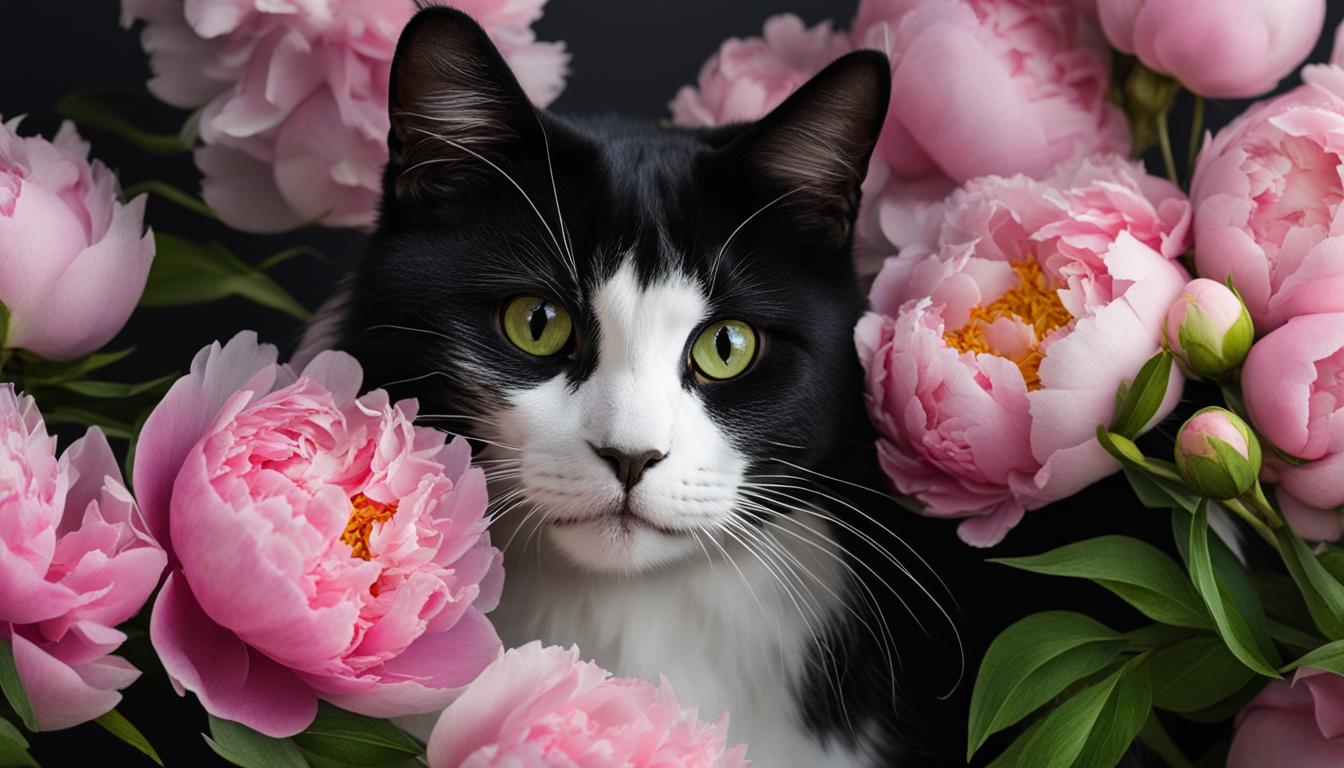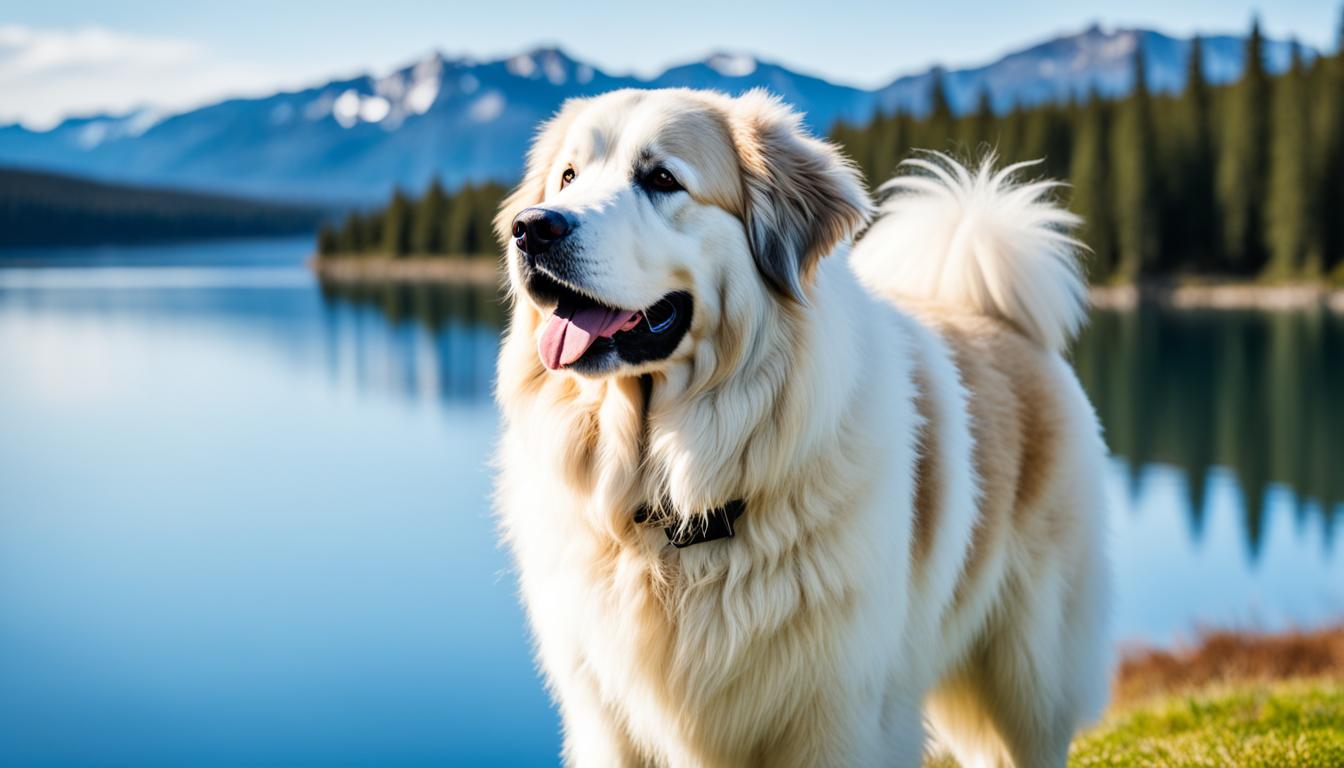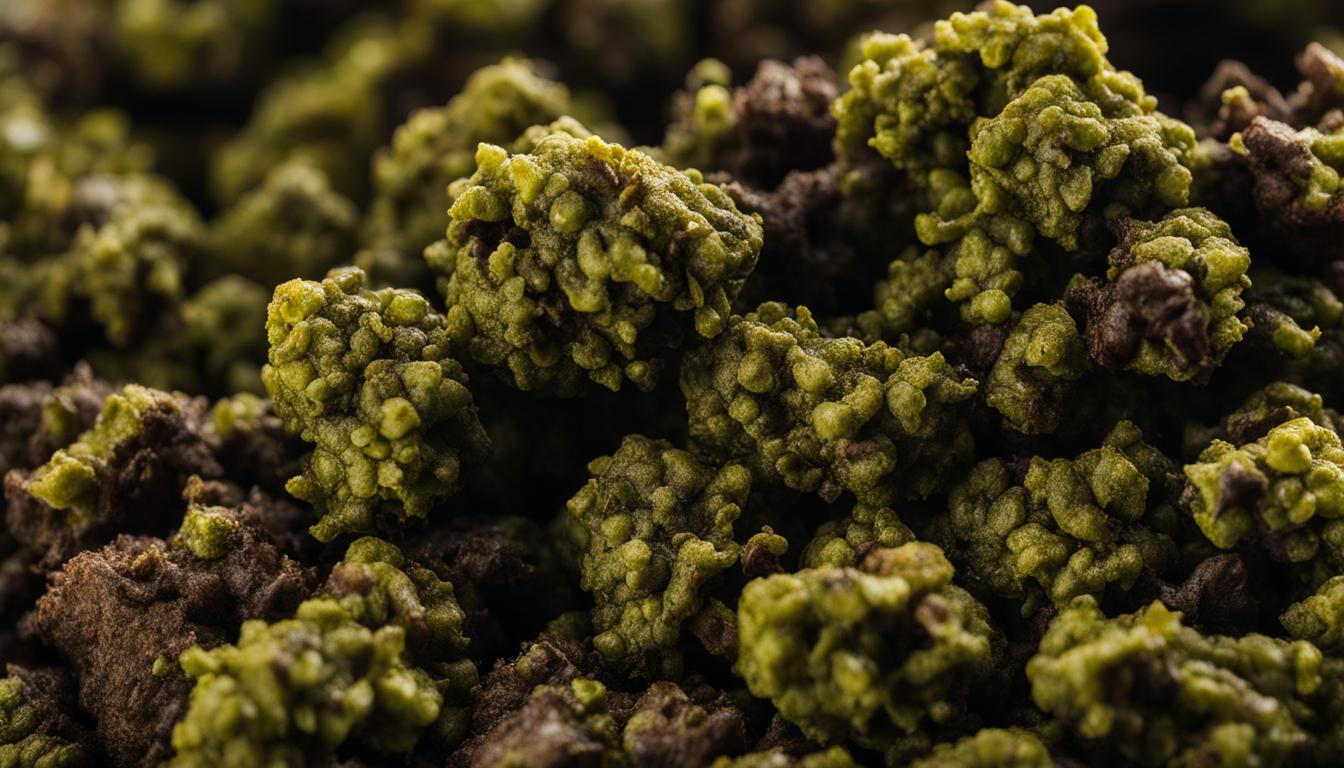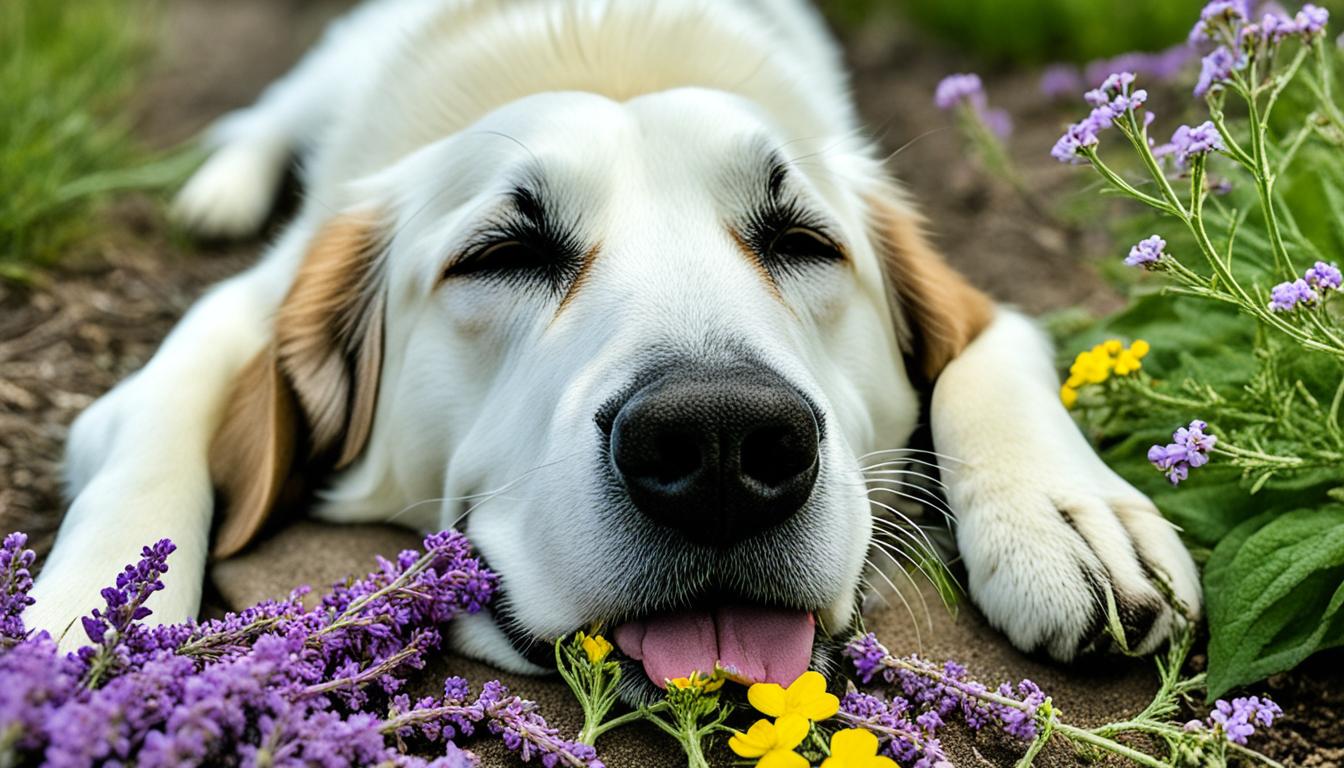Gardens adorned with peonies are a sight to behold, yet, the vibrant blooms carry a hidden risk for our feline companions. The question arises – are peonies poisonous to cats? Indeed, peonies can compromise cat safety, joining the list of toxic plants for cats. These splendid flowers contain paenol, a substance that can lead to gastrointestinal upset among other health issues if ingested by our curious pets.
Whilst many cats exhibit a natural discretion towards unfamiliar vegetation, the potential threat from such common embellishments within our homes and gardens must not be underestimated. Ensuring that our love for horticulture coalesces with pet-friendly gardening practices is essential in safeguarding the well-being of our beloved cats. As responsible pet parents, it is vital to be cognisant of peonies and cats, avoiding unintentional harm by choosing flora that poses no threat to their health.
Key Takeaways
- Peonies contain paenol which is hazardous to feline health.
- Ingesting peonies can lead to gastrointestinal distress in cats.
- Cat ownership requires awareness of potentially toxic plants for cats.
- A proactive approach to pet-friendly gardening can mitigate risks.
- Identifying non-toxic alternatives ensures a safe environment for cats.
Understanding Peony Toxicity for Feline Safety
Peonies, while captivating to the eye with their lush blooms, harbour pernicious substances that pose significant risks to cats. Awareness and understanding of peony toxicity in cats is critical for maintaining the wellbeing of our feline friends. A responsible approach to cat safety and peonies involves recognising the toxicity of these plants and the potential harmful flowers for cats that may end up lurking in our gardens or homes.
How Peonies Affect Your Cat’s Health
Containing a compound known as paenol, peonies are categorised among the toxic plants for cats. Even casual contact with the peony’s bark, where paenol is most concentrated, can lead to gastrointestinal distress in cats. As such, the importance of pet-friendly gardening cannot be overstressed, ensuring that the spaces we create for enjoyment do not inadvertently harm our pets.
Signs of Peony Poisoning in Cats
Recognising signs of plant poisoning in cats is imperative for timely intervention. Key symptoms to look out for include:
- Increased salivation
- Vomiting and diarrhoea
- Neurological signs like fitting
- Respiratory distress
Subtle indicators may also be present, such as a heightened thirst or behavioural changes. These warrant immediate attention, highlighting the gravity of peonies and feline health concerns.
Immediate Actions to Take if a Cat Ingests Peonies
In the event that a cat ingests this toxic plant, swift action is obligatory. Initially, ensure the cat no longer has access to the peony, and eschew home remedies like inducing vomiting. The focus then shifts to seeking professional help:
| Action | Explanation |
|---|---|
| Isolate the Cat | Prevent further ingestion by isolating the pet from the noxious plant. |
| Gather Information | Collect any remnants of the plant the cat may have consumed to aid the veterinary diagnosis. |
| Contact the Vet | Immediate veterinary consultation is critical; delay could exacerbate the toxic effects. |
| Follow Professional Advice | Implement the veterinarian’s recommendations, which may include first aid for poisoned cats and further treatment. |
Ultimately, understanding what to do if a cat eats toxic plants could be life-saving. It underscores the importance of careful plant selection to ensure the harmony between pet ownership and the joy of horticulture.
Are Peonies Poisonous to Cats?
When it comes to the safety of our feline companions within our gardens and homes, specific caution should be exercised with regards to the plants we choose to cultivate and display. A particularly popular yet concerning example would be peonies, whose danger to cats cannot be underestimated. Peonies and cats are a toxic combination due to paenol and other compounds found in the plant that can lead to serious health issues, including gastrointestinal upset.
It’s essential to distinguish between cat-safe flowers and those varieties that could prove harmful. The bewitching peony, with its ruffled petals and alluring fragrance, may delight the senses of humans but is sadly listed among the harmful flowers for cats. Awareness and prevention are key components in crafting a cat-friendly environment, avoiding unnecessary risks to your pet’s health.
To further illuminate the risks and alternatives, let us consider the following table. It presents at a glance a comparison between cat-friendly flowers and peonies, empowering cat owners to make informed decisions when choosing plants for their homes and gardens.
| Flower Name | Toxic to Cats | Safe for Cats |
|---|---|---|
| Peonies | Yes | No |
| Roses | No | Yes |
| Sunflowers | No | Yes |
| Violets | No | Yes |
This information serves as a reminder of the necessity to proactively ensure our pets’ environments are free of harmful flowers for cats, and that a harmonious coexistence between feline curiosity and human aesthetical preferences is attainable through the selection of cat-safe flowers. By choosing non-toxic species, cat owners can still enjoy horticulture and floral arrangements while ensuring their beloved pets remain inquisitive yet unharmed.
Number 1 veterinarian-recommended cat probiotic brand to support digestive health (Kantar Veterinary Tracker, 2021), making it an excellent cat supplement
Conclusion
In summary, fostering a safe habitat for our beloved cats necessitates vigilance and knowledge about the plants we foster in our homes and gardens. The alluring yet perilous nature of peonies underlines the need for pet-friendly gardening practices that prioritise cat safety. As responsible pet owners, we must actively remove toxic plants for cats from their environment and ensure our green spaces are laden with cat-friendly flowers that pose no threat to their well-being.
Creating a Safe Environment for Your Cat
Creating a secure living space for cats doesn’t just contribute to their health; it also provides mental tranquillity for pet owners. By proactively familiarising ourselves with lists of non-toxic and toxic plants, and opting for cat-safe flowers, we pave the way for a harmonious co-existence with our feline companions. Continuous awareness and education on pet-friendly gardening is the cornerstone of preventing accidental ingestions of toxic substances, guaranteeing a happy home for our pets.
Alternatives to Peonies: Cat-Safe Flower Options
For those who admire the aesthetic appeal of floral arrangements yet are cognisant of the hazards peonies and similar plants present, there’s solace in knowing that many beautiful and cat-safe flowers can adorn our gardens and homes. Flowers such as roses, sunflowers, and violets not only brighten up any space but also ensure a risk-free environment for cats to explore. Understanding and selecting these alternatives enhances not only the beauty of our surroundings but also champions the need for sustained pet-friendly gardening protocols.
FAQ
Are peonies poisonous to cats?
Yes, peonies are poisonous to cats. They contain a compound called paenol that can cause gastrointestinal distress if ingested. Cat owners should be cautious and prevent their feline friends from access to peonies to ensure cat safety.
What effects can peonies have on a cat’s health?
Peonies can adversely affect a cat’s health by causing symptoms such as gastrointestinal upset, increased salivation, vomiting, diarrhoea, and in severe cases, fitting or respiratory difficulties. Pet owners should monitor their cats for any signs of distress and seek veterinary care if they suspect peony ingestion.
What are the signs of peony poisoning in cats?
Common signs of peony poisoning in cats include vomiting, diarrhoea, increased salivation, lethargy, abdominal pain, and fitting. In some instances, cats may present respiratory difficulties. If you notice any of these symptoms, it is crucial to seek veterinary assistance immediately.
What should I do if I suspect my cat has ingested peonies?
If you suspect your cat has ingested peonies, immediately remove your cat from the area containing the plant, do not try to induce vomiting or give them salt water, and take your cat to a veterinarian as soon as possible. Providing information about the ingested substance to the vet will be helpful in treatment.
What flowers are safe for cats?
Several flowers are safe for cats, including roses, sunflowers, snapdragons, and violets. These flowers are non-toxic to cats and can be used in gardening and floral arrangements without the risk of harming your pet. It’s always best to consult a list of cat-safe plants to ensure the safety of your pet.
How can I ensure a pet-friendly garden?
To ensure a pet-friendly garden, familiarise yourself with lists of plants that are non-toxic to cats and consistently check your garden for any that may pose a risk. Opt for safe alternatives like cat grass, catnip, and cat-safe flowers to create an environment that is safe and enjoyable for your feline friend.
Can cats recover from ingesting toxic plants like peonies?
Yes, with prompt and appropriate veterinary care, cats can recover from ingesting toxic plants like peonies. The prognosis depends on the amount ingested and the speed of the response to treatment. Always act quickly and follow the advice of your veterinarian.






